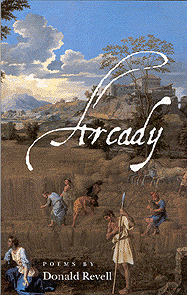Donald Revell grew up in the Bronx, New York. He received his Ph.D. from SUNY-Buffalo, and splits his time between Nevada and Utah, where he is Professor of English and Creative Writing at the University of Utah. Wesleyan University Press published Revell's seventh book of poems, Arcady, in February. Written as a response to the death of his sister and only sibling, Roberta, in 1995, Arcady draws its vision from the well of Arcadia—the utopic Greek realm described as paradise by Virgil, painted by Poussin, scored by Charles Ives, and contemplated by Thoreau.

Revell describes it in the prefatory section of the book as "a place that remains to be seen," not followed, as narrative requires. He further meditates on the death of his sister and the profound effects it had on his thinking and his approach to writing.
Poets & Writers Magazine asked Revell how he expects readers of Arcady to respond to the book's preface.
Donald Revell: I intend the preface to serve as an explicit and public dedication in the old sense: i.e. as a task. I wrote the poems meaning to go to Heaven and to make my best report from there. Of course, I have no wish to distance the readers. Rather, I hope to convince them to take me literally, with all the rigors and consequences thereof.
P&W: Would you elaborate on what this old sense of public dedication is, this task?
DR: By "old sense" of dedication, I mean something to be done with myself, as myself. The only way to write an "Arcady" is to go there, or to see oneself to fail in trying. This is somehow connected with the one thing of importance I emphasize in my teaching: Craft is nothing; sincerity is everything. I prefer "pious Aeneas" to "wily Odysseus." Virgil's hero did not squander his friends nor take credit for the power of a golden bough.
P&W: "Craft is nothing; sincerity is everything." How do you teach this idea? Who do you use, especially among contemporary writers, as your examples for your students?
DR: To teach sincerity. Hard. Hard. It involves respect for the material AS spirit, as in truly knowing how to slice an onion. If I were in charge of admissions, I'd replace the GRE with a simple test: Make a good bowl of soup. In my workshops, we work simply to cut out any lines or phrases that are not literally true. We ask the poem to stand by its words. We ask each other to stand by our words. We urge one another to Be good, trusting the poems to follow suit. Only a good human can write a good poem. Good people can, of course, make terrible errors. But an error is not a lie. A poem can survive error (as in The Cantos)...it cannot survive a lie. Classic example of this good news? Herbert's great "Jordan" poems. Of contemporary poets, I presently encourage my students to read Robin Blaser and Ronald Johnson with open hearts. They're terrific.
P&W: How has your relationship toward the reader changed since the publication of your first book?
DR: In my earlier work I wanted to win an audience and an audience's approval, its admiration. And I did my circus tricks accordingly. Now, if and when I am any good, I seek only the poem's approval. To borrow a phrase from Plotinus, I go alone to the alone.
P&W: In the preface to Arcady, you write "I began to see poems: poems of mine, but hardly made." Nearly all of the poems in the book are 14 lines and thus, there is a formal precedent to each, a sense of inheritance based on form, as well as vision. Is the sonnet, or at least the 14-line length, what appeared before you?
DR: What I see is not the sonnet, but the sonnet's world, its Arcadia...I see thus the poetry of a single "take," an instantaneous sighting (siting). No craft. No process. Only instances.
P&W: Are your poems behind you, then, when a book of them is published? What's next?
DR: What's next for me? I am concerned with the governance of heaven, which is mostly silence. Living in Utah and Nevada, I take my current instruction from snow and sand. They are heavenly forms-substantial and effortless. May poems be so.








